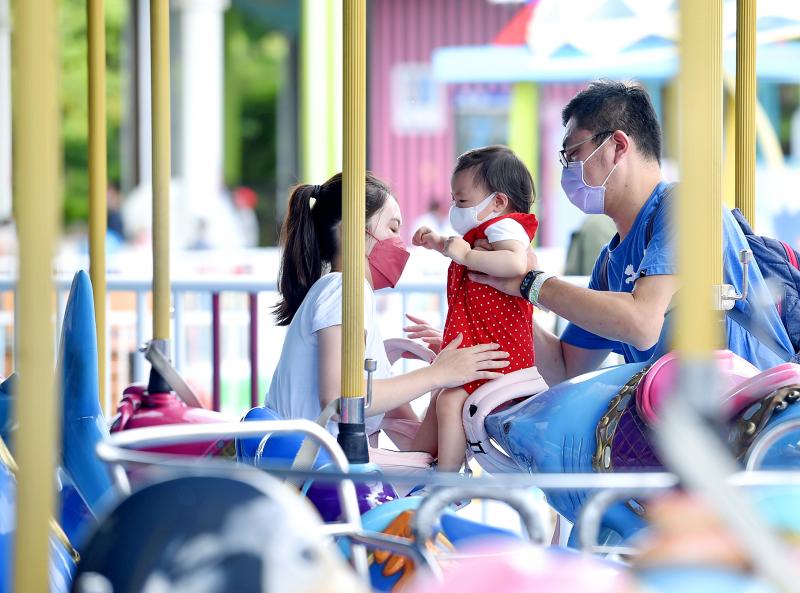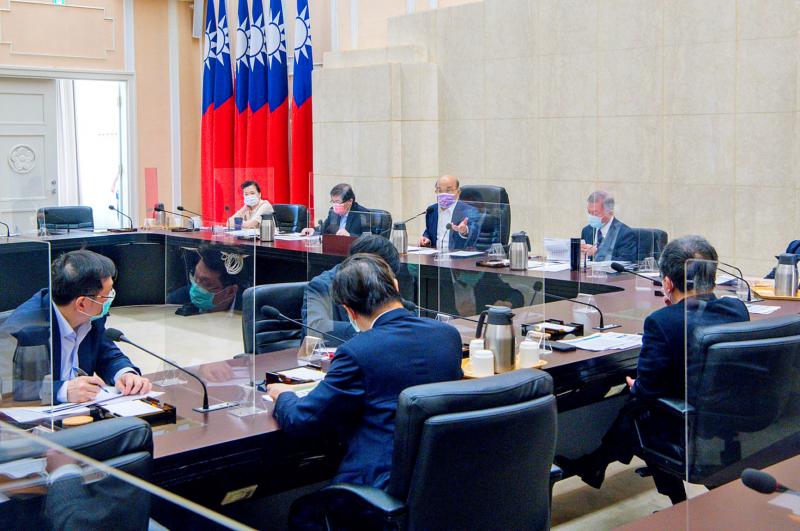A shorter home quarantine period for international travelers and an initial cap of 25,000 inbound travelers per week are being discussed, the government said yesterday, as it considers the first stages of reopening Taiwan’s borders.
Premier Su Tseng-chang (蘇貞昌) in a meeting yesterday morning instructed the Central Epidemic Command Center (CECC) and related ministries to plan for the easing of border controls, as long as the nation can maintain adequate healthcare capacity.
Minister of Health and Welfare Chen Shih-chung (陳時中), who heads the center, said that quarantine requirements would not yet be scrapped, but that the home quarantine period for international travelers might be shortened.

Photo: Peter Lo, Taipei Times
The polymerase chain reaction (PCR) test required of airport arrivals from certain countries might be switched from a nasal swab test to a saliva-based test, he said.
Separately, Minister of Transportation and Communications Wang Kwo-tsai (王國材) yesterday said that the government is considering capping the number of inbound travelers at 25,000 per week in the initial stages of reopening the borders.
“We are still in the plateau phase of a COVID-19 outbreak, and we now have about 17,000 travelers entering the country per week. Once the borders are reopened, the number of inbound travelers is likely to be capped at 25,000 per week during the initial stages,” he said.

Photo: Lu Yi-hsuan, Taipei Times
The Civil Aeronautics Administration is working with airlines to increase flights, he added.
Meanwhile, the CECC yesterday announced that mask regulations and other disease prevention measures would remain in effect until June 30.
People must wear a mask at all times when not at home, even when singing, but they can temporarily remove their mask when eating or drinking, as well as in certain circumstances, including when exercising, having their picture taken, and driving alone in a private vehicle or in a vehicle with family members living in the same household.
Other exceptions include taking part in a live broadcast, being filmed, hosting a broadcast or reporting on a broadcast; giving a speech, a lecture or some other type of public oration; doing outdoor activities related to agriculture, forestry, animal husbandry or aquaculture; and visiting forest recreation areas, beaches or water venues, such as cold or hot springs, spas, saunas or steam rooms.
However, if someone has COVID-19-related symptoms or cannot practice social distancing in an environment with strangers, they are advised to wear a mask, the CECC said.
Taiwan yesterday reported 60,042 new local infections, 61 imported cases and 109 deaths.
Centers for Disease Control (CDC) Director-General Chou Jih-haw (周志浩), head of the CECC’s disease surveillance division, said the numbers were slightly lower, but that it might have been due to lower reporting over the weekend.
CDC Deputy Director-General Philip Lo (羅一鈞), deputy head of the CECC’s medical response division, said that of the new local infections, 468 were cases with moderate or severe symptoms.
As of Sunday, 3,706 people had moderate symptoms, or 0.2 percent of total cases this year, while 1,579 people had severe symptoms, or 0.08 percent, CECC data showed.
Of yesterday’s deaths, 106 people had underlying health conditions, 42 people were unvaccinated and 71 had not received a booster shot, although 38 of them had received a booster, Lo said.
Taiwan’s booster vaccination rate is nearly 70 percent of the total population, while unvaccinated people only account for about 10 percent of the population, he said.
Three of those with severe symptoms are young children: a one-year-old girl with a urologic disease has suspected encephalitis, while a four-year-old boy and a five-year-old boy who did not have a chronic disease had encephalitis, he said.
The boys’ condition improved after treatment and they were discharged, Lo added.
Additional reporting by Shelley Shan

A magnitude 7.0 earthquake struck off Yilan at 11:05pm yesterday, the Central Weather Administration (CWA) said. The epicenter was located at sea, about 32.3km east of Yilan County Hall, at a depth of 72.8km, CWA data showed There were no immediate reports of damage. The intensity of the quake, which gauges the actual effect of a seismic event, measured 4 in Yilan County area on Taiwan’s seven-tier intensity scale, the data showed. It measured 4 in other parts of eastern, northern and central Taiwan as well as Tainan, and 3 in Kaohsiung and Pingtung County, and 2 in Lienchiang and Penghu counties and 1

FOREIGN INTERFERENCE: Beijing would likely intensify public opinion warfare in next year’s local elections to prevent Lai from getting re-elected, the ‘Yomiuri Shimbun’ said Internal documents from a Chinese artificial intelligence (AI) company indicated that China has been using the technology to intervene in foreign elections, including propaganda targeting Taiwan’s local elections next year and presidential elections in 2028, a Japanese newspaper reported yesterday. The Institute of National Security of Vanderbilt University obtained nearly 400 pages of documents from GoLaxy, a company with ties to the Chinese government, and found evidence that it had apparently deployed sophisticated, AI-driven propaganda campaigns in Hong Kong and Taiwan to shape public opinion, the Yomiuri Shimbun reported. GoLaxy provides insights, situation analysis and public opinion-shaping technology by conducting network surveillance

‘POLITICAL GAME’: DPP lawmakers said the motion would not meet the legislative threshold needed, and accused the KMT and the TPP of trivializing the Constitution The Legislative Yuan yesterday approved a motion to initiate impeachment proceedings against President William Lai (賴清德), saying he had undermined Taiwan’s constitutional order and democracy. The motion was approved 61-50 by lawmakers from the main opposition Chinese Nationalist Party (KMT) and the smaller Taiwan People’s Party (TPP), who together hold a legislative majority. Under the motion, a roll call vote for impeachment would be held on May 19 next year, after various hearings are held and Lai is given the chance to defend himself. The move came after Lai on Monday last week did not promulgate an amendment passed by the legislature that

AFTERMATH: The Taipei City Government said it received 39 minor incident reports including gas leaks, water leaks and outages, and a damaged traffic signal A magnitude 7.0 earthquake struck off Taiwan’s northeastern coast late on Saturday, producing only two major aftershocks as of yesterday noon, the Central Weather Administration (CWA) said. The limited aftershocks contrast with last year’s major earthquake in Hualien County, as Saturday’s earthquake occurred at a greater depth in a subduction zone. Saturday’s earthquake struck at 11:05pm, with its hypocenter about 32.3km east of Yilan County Hall, at a depth of 72.8km. Shaking was felt in 17 administrative regions north of Tainan and in eastern Taiwan, reaching intensity level 4 on Taiwan’s seven-tier seismic scale, the CWA said. In Hualien, the